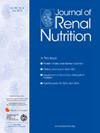Plant-Based Diet and Chronic Kidney Disease: A Systematic Review and Meta-Analysis
IF 3.2
3区 医学
Q2 NUTRITION & DIETETICS
引用次数: 0
Abstract
Objective
We aimed to perform a systematic review and meta-analyses to evaluate the impact of plant-based diet (PBD) on chronic kidney disease (CKD).
Methods
A systematic search of PubMed and Embase was conducted from inception to August 2023 to evaluate the association between adopting a PBD and the incidence, progression, and mortality of CKD. Odds ratios (ORs) and 95% confidence intervals (CIs) were estimated using a random effects model. This meta-analysis was preregistered in the PROSPERO.
Results
A total of 121,927 participants were included, aged between 18 and 74 years, and were followed up for a weighted average of 11.2 years. Adopting PBD is associated with a significantly reduced risk of developing CKD OR = 0.75, 95% CI (0.65-0.86), P < .0001] across 93,857 participants. Similar results were observed in subgroup analyses that examined higher quintiles/quartiles (Q2-Q5) and tertiles (T2-T3) of PBD versus Q1/T1, with overall effect measures of 0.92 (95% CI; 0.86-0.98) and 0.88 (95% CI; 0.82-0.93), respectively. When adjusting for CKD-related comorbidities in patients following PBD (adjusted models M1, M2, and M3), significant findings were also observed, with an overall OR of 0.86 (95% CI; 0.79-0.93).
Conclusion
Adopting PBD was significantly associated with 26% lower incidences of CKD. Higher intake of PBD showed a dose-dependent relationship with lower risk of CKD incidence and slower CKD progression. Unhealthy PBD may not confer renal protective effects compared to healthy PBD.
植物性饮食与慢性肾病:系统回顾与元分析》。
目的:我们旨在进行一项系统综述和荟萃分析,以评估植物性饮食(PBD)对慢性肾脏疾病(CKD)的影响。方法:系统检索PubMed和Embase,从成立到2023年8月,评估采用PBD与CKD发病率、进展和死亡率之间的关系。使用随机效应模型估计优势比(ORs)和95%置信区间(ci)。该荟萃分析已在PROSPERO中预先登记。结果:共纳入121,927名参与者,年龄在18 - 74岁之间,加权平均随访11.2年。采用PBD与CKD发生风险显著降低相关OR=0.75, 95% CI(0.65, 0.86),结论:采用PBD与CKD发病率降低26%显著相关。较高的PBD摄入量与较低的CKD发病率和较慢的CKD进展呈剂量依赖关系。与健康PBD相比,不健康PBD可能不具有肾脏保护作用。
本文章由计算机程序翻译,如有差异,请以英文原文为准。
求助全文
约1分钟内获得全文
求助全文
来源期刊

Journal of Renal Nutrition
医学-泌尿学与肾脏学
CiteScore
5.70
自引率
12.50%
发文量
146
审稿时长
6.7 weeks
期刊介绍:
The Journal of Renal Nutrition is devoted exclusively to renal nutrition science and renal dietetics. Its content is appropriate for nutritionists, physicians and researchers working in nephrology. Each issue contains a state-of-the-art review, original research, articles on the clinical management and education of patients, a current literature review, and nutritional analysis of food products that have clinical relevance.
 求助内容:
求助内容: 应助结果提醒方式:
应助结果提醒方式:


